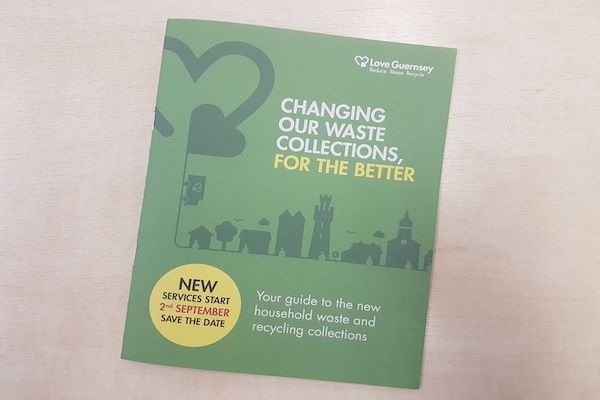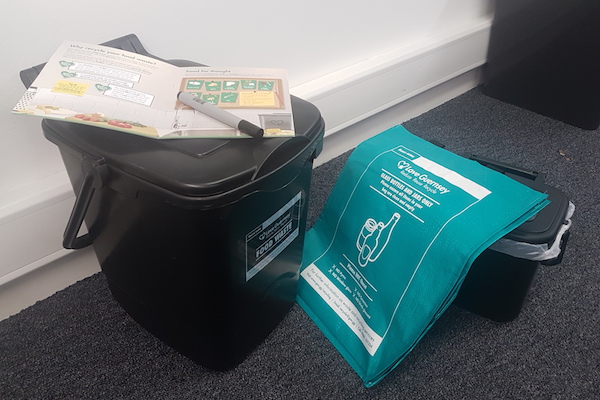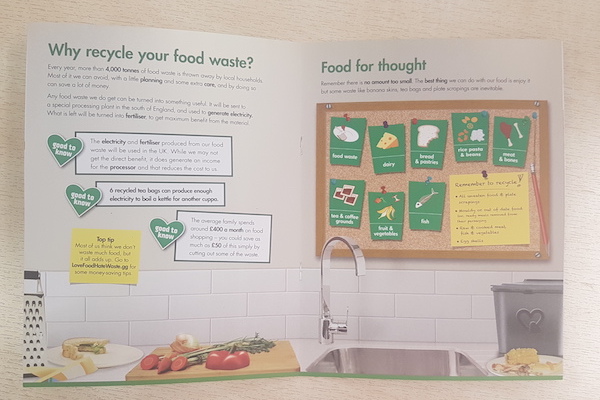

Guernsey's long discussed new waste strategy finally comes into force today - with new rubbish collections starting this week.
Homeowners who have been advised to put their recycling out on a Sunday night for a Monday morning collection, should do so with St Sampson residents among those seeing a change in their collection dates.
Information tailored to residents living in each parish, across the island, was delivered to each household by Guernsey Post, along with more than 26,000 kits which included a smaller and larger food waste caddy, liner bags and a glass recycling bag - along with a pen so there was no excuse not to ensure the owner of each individual bin and bag could be identified.

Pictured: The recycling kits distributed to every household in the island ahead of today's launch
The 'lockable' larger plastic bin is designed for setting out food waste for collection every week, while the smaller, counter-top plastic 'caddy' is designed to sit inside our kitchens. Some people who live in flats and shared residential spaces will not have received the larger food waste bins as alternative arrangements have been made for them.
The "reusable, heavy duty and wipe clean bag" for the new glass recycling collections was designed to fold away when not in use, and they have a weight stitched in to the bottom so that they cannot be easily blown around.
An instruction leaflet in the pack explained how the new collections will work for individual households with further information available online at gov.gg or from the Parish douzaines which will retain responsibility for collections.

Pictured: Some of the information contained in the leaflet which was distributed to every household in the island
Food waste accounts for more than 40% of the contents of household black bags currently - so from now on it will be collected weekly using the caddies which have been provided.
Most households currently have their bins picked up once a week, with only St Peter Port having two collections a week under the previous system.
With food waste collected weekly, the Recycling team said households will be able to reduce the remaining 'black bag' material they put out, so that can be collected less frequently. This general refuse will become a fortnightly service for most, to encourage waste reduction and recycling, reduce overall collection costs, and help households minimise their waste bills.
Some of the more built-up areas of St Peter Port will continue to have weekly pick-ups for general refuse, but the frequency of other collections will be the same as the rest of the island.
Glass will be collected on alternate weeks to the general refuse collections, and the current blue and clear kerbside bags for other recycling will continue to be picked up fortnightly on alternate weeks.
The changes to household recycling collections were planned to coincide with the commissioning of the new waste transfer station, which has been built at Longue Hougue and the start of the contract to ship our waste to Sweden, which was signed last week.
Separately collected food waste will now be pre-processed at the transfer station, where it will undergo a different method of treatment to other black bag waste before it is exported to a specialist facility in the south of England, where it will be used to generate electricity and produce a compost material.
The new collections will begin from 2 September with no additional cost to homeowners.
The new charging system will come into place in January with each household to pay £85 per year to the parishes for collections and £2.50 per black bag they put out for collection. That charge will be covered by way of stickers which will need to be bought from local shops and stuck on the bags.
The States recycling team said this was intended to give everyone time to familiarise themselves with the revised arrangements, before the introduction of the new 'pay as you throw' system in 2019. In future, the total costs of waste and recycling collections, and all subsequent processing and treatment, are expected to average around £6 per week per household.
Comments
Comments on this story express the views of the commentator only, not Bailiwick Publishing. We are unable to guarantee the accuracy of any of those comments.